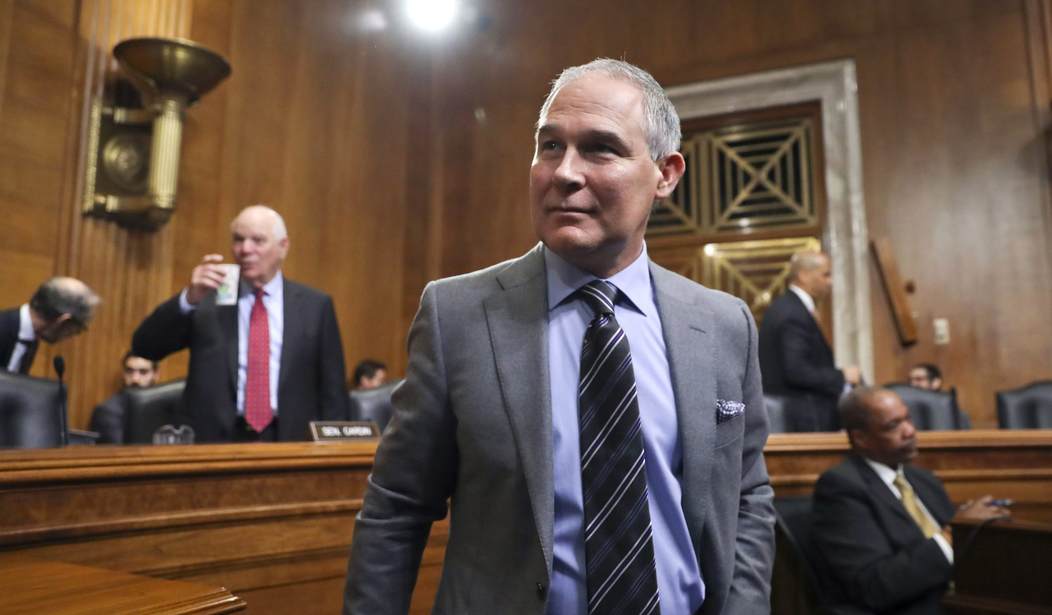WASHINGTON – EPA Administrator Scott Pruitt on Tuesday backtracked on critical comments he made against then-candidate Donald Trump in February 2016, when he predicted that Trump would be abusive to the Constitution and a dangerous bully if elected.
During a hearing before the Senate Committee on Environment and Public Works, Sen. Sheldon Whitehouse (D-R.I.) drew attention to the comments Pruitt made during an interview with KFAQ radio station in Tulsa, Okla.,with conservative host Pat Campbell.
During the 2016 interview, which took place about a year before the administrator was confirmed, Pruitt apparently said, “I believe that Donald Trump in the White House would be more abusive to the Constitution than Barack Obama, and that’s saying a lot.”
The former Oklahoma attorney general also agreed with Campbell’s assessment that “everything we loathe and detest about Barack Obama and his abuses of power, Trump is the same thing, except he’s our bully.”
“That’s right,” Pruitt told Campbell.
Pruitt also agreed with a comment from Campbell’s father suggesting that Trump is dangerous.
“You know, your dad is very astute,” Pruitt said.
On Tuesday, Pruitt told Whitehouse that while he appeared multiple times on Campbell’s radio show, he did not recall making those comments.
“And I don’t echo that today at all,” Pruitt added.
Democrats attacked Pruitt during the hearing for what they perceived as a lack of action on his stated goal of eliminating lead from American drinking water within a decade. Sen. Tammy Duckworth (D-Ill.) noted that last month before the House Energy and Commerce Committee, Pruitt called lead one of the “greatest environmental threats” that the U.S. faces as a country. The EPA administrator has also repeatedly referenced a “war on lead.”
On Tuesday, Pruitt told the committee that the EPA currently has a safe blood-lead level of 15 parts per billion for children, but states are considering lowering that level. He suggested that his own personal view differs from the EPA standard.
“From my perspective, as I’ve indicated, I don’t think there is a safe level, and we need to eradicate it from our drinking water,” Pruitt told Duckworth.
“The right answer is zero, according to scientific literature, so it would be wonderful if you could take what your opinion is and actually apply it at EPA,” she said. “Unfortunately, your rhetoric doesn’t match your actions.”
Duckworth described how the EPA over the past several months has taken steps to “make it harder” for states and agencies to limit lead exposure. Though the EPA originally planned to update its Lead and Copper Rule by 2018, Pruitt has since delayed that action until at least 2020.
“This doesn’t sound much like a war on lead,” Duckworth said. “A two-year delay is not acceptable because every day I have children who are exposed to lead, and they don’t have 700 days to wait.”
Pruitt responded that updating the rule is a “priority for this administration.”
Duckworth also called attention to Trump’s 10-year policy priorities, which call for the elimination of EPA’s Lead Risk Reduction Program. That program is used to train contractors and educate the public about safely removing lead paint from homes. Duckworth asked Pruitt to speak with the president and prioritize the program.
“It is a point of emphasis for us to update the rules and take an aggressive posture to eradicate lead,” Pruitt said.
During a second round of questioning, Duckworth touched on Trump’s recent alleged comments about African countries and Haiti, which he reportedly called “shithole countries” during a meeting with lawmakers and officials in the Oval Office. Duckworth asked Pruitt about his recent visit to Morocco.
“Can I assume … you do not find Morocco, a North African nation, to be a shithole when you visited?” Duckworth asked.
Duckworth’s time expired before Pruitt could respond.
Whitehouse, during his initial round of questions with Pruitt, criticized the agency for allowing political appointees to stack scientific advisory committees with industry representatives. The Rhode Island Democrat specifically cited a report from the Center for Science and Democracy, which suggested that the EPA was replacing scientific experts on the Clean Air Scientific Advisory Committee and Science Advisory Board with industry representatives who are unqualified and carry conflicts of interest.









Join the conversation as a VIP Member